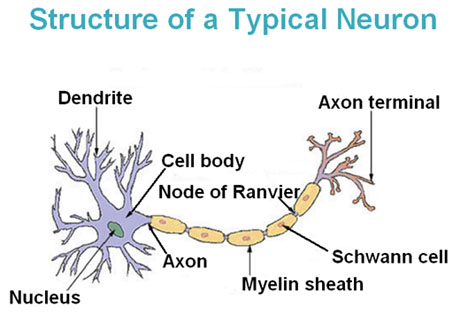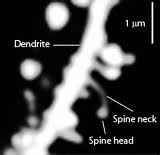It looks like you're using an Ad Blocker.
Please white-list or disable AboveTopSecret.com in your ad-blocking tool.
Thank you.
Some features of ATS will be disabled while you continue to use an ad-blocker.
11
share:
This is a nerve cell or neuron.

The dendrites receive information from other nerve cells. The axon forwards information to other nerve cells.
The dendrites are so called because they look like a tree. Dendron means tree in ancient greek.
The dendrites do not have smooth surfaces as in the image above. In fact they have protruberances on them called dendritic spines rather like leaves on a tree. This is a close-up of a dendrite. You can observe the spines or leaves.

The spines/leaves are growing and receding all day long. This is a video of the spines/leaves (from the hearing part of the brain of a mouse).
Here is another video of the spines/leaves on the dendrite.
It seems that in most psychiatric diseases the spines/leaves are decreased. Reduced spines/leaves are associated with
1. Fear - or anxiety
2. Self-pity - or depression
3. Resentment - or hatred
4. Dishonesty - and even criminality
5. Memory impairment - or dementia
6. Auditory hallucinations - as in schizophrenia.
7. Following a convulsion.
Even simple things such as hunger, anger, loneliness or tiredness reduce spines/leaves. Being too serious may also have the same effect.
I like to compare the images to a tree changing from summer to winter when one feels lousy and vice-versa when one feels good.
What makes spines/leaves grow to make one feel good?
It seems the following may help:
1. Sometimes it happens spontaneously - the eureka moment.
2. Having positive people around you.
3. Avoiding isolation.
4. Pets.
5. Light.
6. Physical/mental exercise.
7. Sex.
8. Pleasant music/images.
9. Curcumin in curries/omega 3 fish oils.
10. Anti-depressants e.g. Prozac.
11. Alcohol, nicotine, coc aine, amphetamine.
12. Electrical brain stimulation.
This simple model may be of use to people who are in a winter part of their lives and seek to change from this:

to this


The dendrites receive information from other nerve cells. The axon forwards information to other nerve cells.
The dendrites are so called because they look like a tree. Dendron means tree in ancient greek.
The dendrites do not have smooth surfaces as in the image above. In fact they have protruberances on them called dendritic spines rather like leaves on a tree. This is a close-up of a dendrite. You can observe the spines or leaves.

The spines/leaves are growing and receding all day long. This is a video of the spines/leaves (from the hearing part of the brain of a mouse).
Here is another video of the spines/leaves on the dendrite.
It seems that in most psychiatric diseases the spines/leaves are decreased. Reduced spines/leaves are associated with
1. Fear - or anxiety
2. Self-pity - or depression
3. Resentment - or hatred
4. Dishonesty - and even criminality
5. Memory impairment - or dementia
6. Auditory hallucinations - as in schizophrenia.
7. Following a convulsion.
Even simple things such as hunger, anger, loneliness or tiredness reduce spines/leaves. Being too serious may also have the same effect.
I like to compare the images to a tree changing from summer to winter when one feels lousy and vice-versa when one feels good.
What makes spines/leaves grow to make one feel good?
It seems the following may help:
1. Sometimes it happens spontaneously - the eureka moment.
2. Having positive people around you.
3. Avoiding isolation.
4. Pets.
5. Light.
6. Physical/mental exercise.
7. Sex.
8. Pleasant music/images.
9. Curcumin in curries/omega 3 fish oils.
10. Anti-depressants e.g. Prozac.
11. Alcohol, nicotine, coc aine, amphetamine.
12. Electrical brain stimulation.
This simple model may be of use to people who are in a winter part of their lives and seek to change from this:

to this

reply to post by dr treg
In grad school, my thesis was on new nerve growth in the spinal cord. I used limb bud mesenchyme as a trigger and utilized a flourescent
lipophilic dye to identify new nerve growth in Sykes-Moore chambers.
I taught endocrinology (part of my TA RA assignment) so I can agree that mood, based on endocrine levels may have an effect on nerve growth.
I taught endocrinology (part of my TA RA assignment) so I can agree that mood, based on endocrine levels may have an effect on nerve growth.
reply to post by dr treg
reply to post by beezzer
can you please give some scientific papers for all that...this topic would make a nice small chapter in my BA thesis
and @ OP - ty for the topic =)
reply to post by beezzer
can you please give some scientific papers for all that...this topic would make a nice small chapter in my BA thesis
and @ OP - ty for the topic =)
edit on 3-3-2012 by Hessdalen because: mindcontrol
Originally posted by Hessdalen
reply to post by dr treg
reply to post by beezzer
can you please give some scientific papers for all that...this topic would make a nice small chapter in my BA thesis
and @ OP - ty for the topic =)edit on 3-3-2012 by Hessdalen because: mindcontrol
Sure. Let me U2U the info if you like.
reply to post by chrismicha77
Some antidepressants have been shown to increase neurogenesis. The effect happens a couple months after taking some of them, which is when antidepressants tend to work. Neurotransmitters are thought to be what's responsible for depression but it could be that new neurons are the bigger factor in "contentment" I guess you could say.
But agreed on number 11, what were you thinking OP?
Alcohol increases the effects of the neurotransmitter GABA promoting relaxation, but it doesn't increase neuron growth according to general consensus. Nicotine via cigarettes has been shown to activate the immune system in the brain causing a degree of inflammation and cell death.
Some antidepressants have been shown to increase neurogenesis. The effect happens a couple months after taking some of them, which is when antidepressants tend to work. Neurotransmitters are thought to be what's responsible for depression but it could be that new neurons are the bigger factor in "contentment" I guess you could say.
But agreed on number 11, what were you thinking OP?
Alcohol increases the effects of the neurotransmitter GABA promoting relaxation, but it doesn't increase neuron growth according to general consensus. Nicotine via cigarettes has been shown to activate the immune system in the brain causing a degree of inflammation and cell death.
re anti-depressants effect on the spines/leaves
The following article is interesting:
Prozac made my cells spikey
"The mood-improving actions of antidepressants do not depend on neurogenesis but are associated with neuronal remodeling."
re short-term effect of alcohol on spines/leaves
Brain chemistry ties anxiety and alcoholism
"The researchers found that short-term alcohol exposure increased the number of dendritic spines in certain regions of the amygdala (fear center), producing anti-anxiety effects."
re nicotine,coc aine, amphetamine effect on spines/leaves
Effect of nicotine on dendritic spine density in the reward center of the brain
Electroconvulsive treatment, transcranial magnetic stimulation and deep brain electrical stimulation also increase spines/leaves
The following article is interesting:
Prozac made my cells spikey
"The mood-improving actions of antidepressants do not depend on neurogenesis but are associated with neuronal remodeling."
re short-term effect of alcohol on spines/leaves
Brain chemistry ties anxiety and alcoholism
"The researchers found that short-term alcohol exposure increased the number of dendritic spines in certain regions of the amygdala (fear center), producing anti-anxiety effects."
re nicotine,coc aine, amphetamine effect on spines/leaves
Effect of nicotine on dendritic spine density in the reward center of the brain
Electroconvulsive treatment, transcranial magnetic stimulation and deep brain electrical stimulation also increase spines/leaves
Thanks for the thread. I didn't know I was increasing my brain power drinking alcohol and stimulating my brain by watching half naked women.
I wonder if alcohol could explain why in times past, I have experienced super speed where arcade games appear to be moving much slower than normal. When that happens it's like I can move and think a whole lot faster. I do wonder how much beer I need to drink to get a steady growth of brain power.
Anyway, thanks for the thread.
I knew I was feeling better tonight and didn't know my brain was getting stimulated so much. Thanks for the heads up. I really do feel better tonight and I'm not even sure why.
I've noticed similar effects when I experience a runner's high and it seems similar to drinking a few beers.
I wonder if alcohol could explain why in times past, I have experienced super speed where arcade games appear to be moving much slower than normal. When that happens it's like I can move and think a whole lot faster. I do wonder how much beer I need to drink to get a steady growth of brain power.
Anyway, thanks for the thread.
I knew I was feeling better tonight and didn't know my brain was getting stimulated so much. Thanks for the heads up. I really do feel better tonight and I'm not even sure why.
I've noticed similar effects when I experience a runner's high and it seems similar to drinking a few beers.
Prozac is full of fluoride about 30% worth, we all know that fluoride is a poison.
Alcohol is damaging to the brain. Brain scans done on people who drink moderate to heavily have reduced brain mass. Also it looks almost like swiss cheese, or memory loss.
Now I've heard reports that one drink a night helps heart heath but not brain function.
pubs.niaaa.nih.gov...
Alcohol is damaging to the brain. Brain scans done on people who drink moderate to heavily have reduced brain mass. Also it looks almost like swiss cheese, or memory loss.
Now I've heard reports that one drink a night helps heart heath but not brain function.
pubs.niaaa.nih.gov...
reply to post by dr treg
EXCELLENT simple explanation and description. Certainly helps explain why addicts become addicted. Makes me wonder too - anyone here addicted to sticking their fingers in live sockets?
S&F&
EXCELLENT simple explanation and description. Certainly helps explain why addicts become addicted. Makes me wonder too - anyone here addicted to sticking their fingers in live sockets?
10. Anti-depressants e.g. Prozac.
11. Alcohol, nicotine, coc aine, amphetamine.
12. Electrical brain stimulation.
S&F&
new topics
-
Those Great Fresh Pet Commercials
Television: 2 hours ago -
S.C. Jack Smith's Final Report Says Trump Leads a Major Conspiratorial Criminal Organization!.
Political Conspiracies: 4 hours ago -
Advice for any young Adult .
General Chit Chat: 5 hours ago -
Joe meant what he said about Hunter's pardon....
US Political Madness: 6 hours ago -
Regent Street in #London has been evacuated due to a “bomb threat.”
Other Current Events: 6 hours ago -
It’s Falling…
Philosophy and Metaphysics: 8 hours ago -
Steering the Titantic from the Drydock.
Rant: 11 hours ago
top topics
-
Steering the Titantic from the Drydock.
Rant: 11 hours ago, 10 flags -
Joe meant what he said about Hunter's pardon....
US Political Madness: 6 hours ago, 10 flags -
Advice for any young Adult .
General Chit Chat: 5 hours ago, 8 flags -
S.C. Jack Smith's Final Report Says Trump Leads a Major Conspiratorial Criminal Organization!.
Political Conspiracies: 4 hours ago, 8 flags -
It’s Falling…
Philosophy and Metaphysics: 8 hours ago, 4 flags -
Regent Street in #London has been evacuated due to a “bomb threat.”
Other Current Events: 6 hours ago, 3 flags -
Those Great Fresh Pet Commercials
Television: 2 hours ago, 2 flags
active topics
-
S.C. Jack Smith's Final Report Says Trump Leads a Major Conspiratorial Criminal Organization!.
Political Conspiracies • 25 • : DAVID64 -
What Comes After January 20th
Mainstream News • 26 • : cherokeetroy -
Los Angeles brush fires latest: 2 blazes threaten structures, prompt evacuations
Mainstream News • 46 • : NoCorruptionAllowed -
Claim: General Mark Milley Approved Heat and Sound Directed Energy Weapons During 2020 Riots
Whistle Blowers and Leaked Documents • 30 • : BeyondKnowledge3 -
Post A Funny (T&C Friendly) Pic Part IV: The LOL awakens!
General Chit Chat • 8004 • : KrustyKrab -
Planned Civil War In Britain May Be Triggered Soon
Social Issues and Civil Unrest • 18 • : AdultMaleHumanUK -
Advice for any young Adult .
General Chit Chat • 12 • : grey580 -
President Carter has passed
Mainstream News • 43 • : Oldcarpy2 -
Steering the Titantic from the Drydock.
Rant • 41 • : Scratchpost -
Those Great Fresh Pet Commercials
Television • 2 • : AlroyFarms
11
